| |
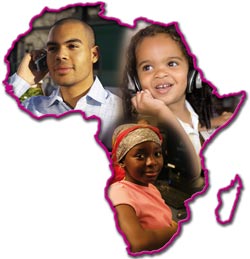
Sony Ericsson
Alamy |
The Kigali Summit
Connecting Africa gathers pace
The Connect Africa Summit that took place in
Kigali, Rwanda, on 29–30 October 2007 attracted more than 1000 participants from
54 countries, including Heads of State and Government. Forty-three countries in
Africa were represented, with 23 at the ministerial level. In addition, leading
industry players participated, such as
British Telecom, Cisco, Ericsson, GSM Association, Huawei, Qualcomm, NTT DoCoMo,
Neustar, Nokia, Siemens and Microsoft. Also taking part were international
financial institutions, regional development banks, international and regional
organizations and other stakeholders.
|
The Connect Africa Summit was organized by ITU with the African Union,
the World Bank Group and the United Nations Global Alliance for ICT and
Development, in partnership with the African Development Bank, the African
Telecommunications Union, the United Nations Economic Commission for Africa and
the Global Digital Solidarity Fund. |
|
The primary aim of the summit was to mobilize the human, financial and
technical resources required to bridge major gaps in information and
communication technologies (ICT) infrastructure, so as to support affordable
connectivity and services to stimulate economic growth throughout Africa. It
sought ways to achieve the connectivity goals of the World Summit on the
Information Society (WSIS), which must be reached quickly to support attainment
of the United Nations Millennium Development Goals (MDGs) by 2015.
Heads of State and Government
In opening the summit, President Kagame underlined that "investment and trade
— as opposed to aid and charity — must drive the transformation of our
economies". He called for a dynamic ICT sector to connect Africa to the global
information superhighway. "In order to realize this much-needed economic
revolution, we have to forge productive relationships between government and
business," said Mr Kagame.
Presidents Pierre Nkurunziza of Burundi, Blaise Compaoré of Burkina Faso,
Ismail Omar Guelleh of Djibouti, Bingu wa Mutharika of Malawi, and Abdoulaye
Wade of Senegal, with Deputy Prime Minister Constance T. Simelane of Swaziland,
also
attended the event. They said that with
less than eight years to go, urgent action was needed to achieve the WSIS
targets
and the MDGs.
| |
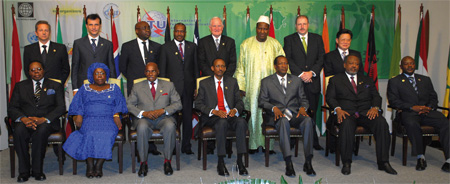
ITU/M. Zouhri
Leaders at the Connect Africa Summit
Front row (left to right):
- Malawi’s President Bingu wa Mutharika
- Swaziland’s Deputy Prime Minister Constance T. Simelane
- Senegal’s President Abdoulaye Wade
- Rwanda’s President Paul Kagame
- Burkina Faso’s President Blaise Compaoré
- Djibouti’s President Ismail Omar Guelleh
- Burundi’s President Pierre Nkurunziza
Back row (from left to right):
- Special adviser to the President of the European Commission, José Manuel
de Morais Briosa e Gala
- President of the State Council of the Republic and Canton of Geneva,
Charles Beer
- President of the African Development Bank,
Donald Kaberuka
- ITU Secretary-General, Dr Hamadoun I. Touré
- Chairman of the Board of Intel Corporation and Chairman of the United
Nations Global Alliance for ICT and Development (GAID), Craig R. Barrett
- Chairperson of the Commission of the African Union, Professor Alpha Oumar
Konaré
- Director of Operations, World Bank, Africa Region,
Hartwig Schafer
- United Nations Under-Secretary-General for Economic and Social Affairs, Sha
Zukang
|
|
Open for business
Representing United Nations Secretary-General Ban Ki-moon,
Under-Secretary-General for Economic and Social Affairs Sha Zukang said the
summit illustrated the potential of public-private partnerships, which, he
added, augured well for the hopes and aspirations of all of the people of Africa
for a better future. He recalled that WSIS had "set a clear course of action for
advancing the information society and for achieving the Millennium Development
Goals — our common vision to build a better world for all in the 21st century".
Mr Sha underlined that narrowing the digital divide between rich and poor
nations was central to development efforts.
"Africa is open for business," said ITU Secretary-General Hamadoun Touré. "We
are looking for investment through win-win partnerships in a viable marketplace
by an expanding ICT industry." Dr Touré added that "ICT is a catalyst and an
enabler in all sectors of the economy in Africa," as well as "the accelerator to
achieve the MDGs by 2015".
The President of the African Development Bank, Donald Kaberuka, called on
African leaders to put in place regulatory frameworks that help to enhance
growth. He said it was important for African countries to seek partnerships with
the private sector to bridge the digital divide.
Craig Barrett, Chairman of Intel Corporation, who also chairs the UN Global
Alliance for ICT and Development (GAID), said "Africa has a great opportunity to
leap forward with new technologies. This has been already demonstrated with the
very rapid adoption of mobile telephony. Emerging wireless broadband
technologies offer a similar opportunity with regard to the Internet. But this
requires both availability of radio spectrum and increased investment into the
gaps in backbone networks." Mr Barrett added that it is not a technology
problem. "The technology is waiting to be deployed. We now need the government
priorities, decisions, and policies to drive the implementation of a pan-African
infrastructure," he said.
Professor Alpha Oumar Konaré, Chairperson of the Commission of the African
Union, welcomed the presence of the private sector at the summit, adding that
governments should seize the opportunity to enact better regulations for
companies to invest in the ICT sector.
The summit has a very practical aim, reaffirmed Director of ITU’s
Telecommunication Development Bureau Sami Al Basheer Al Morshid. "Our focus is
on concrete commitments and partnerships," he said. "The reality is that
broadband networks have become core infrastructure of the modern economy.
Without these networks, Africa will not be able to fairly compete — to attract
investment and high-paying, skilled jobs." He explained that, for ITU, the
summit also represented an important way to implement actions called for at the
World Telecommunication Development Conference (Doha, 2006).
Major announcements
Mobile operators plan USD 50 billion investment
The GSM Association, which represents mobile operators worldwide, announced
at the summit that the mobile industry plans to invest more than USD 50 billion
in sub-Saharan Africa over the next five years to provide more than 90 per cent
of the population with mobile coverage. It said the investment will be used to
extend the reach of GSM mobile networks, enhanced with GPRS, EDGE and HSPA
technologies, to provide mobile multimedia services, including Internet access.
| |
Intel’s new broadband computer lab in Kigali
Intel will donate a new computer laboratory to the Fawe Girls’ School in
Kigali, Rwanda, as part of its World Ahead programme. The donated computers are
built by Rwanda Network Computer, a local start-up company. The facility will be
connected to the Internet via a WiMAX broadband connection provided by MTN
Rwanda.
|
Since 2000, the mobile telephony industry has invested USD 35 billion in
sub-Saharan Africa, according to the GSM Association. "This surge in investment
by the mobile industry has changed the lives of millions of Africans, catalyzing
economic development and strengthening social ties," said Rob Conway, CEO of the
GSM Association.
MTN, Orange, Vodacom and Zain subsidiary Celtel are among the mobile
operators planning to invest heavily in the expansion and enhancement of their
networks. "We have the passion and dedication to provide Africa with a world
class infrastructure," said MTN Group President and CEO Phuthuma Nhleko.
World Bank to double its investment
Hartwig Schafer, World Bank Director of Operations, Africa Region, said the
bank expects to double its commitment for ICT infrastructure in Africa to USD 2 billion
by 2012, from its current investment programme of USD 1 billion over the past
five years.
The new financing would support government-business partnerships, especially for
affordable high-speed Internet and improved connectivity of rural areas and
small towns, said Mr Schafer. The bank would also partner with universities and
other bodies to offer training for regulatory staff across Africa.
EC to support Trans-African networks and regulatory reform
The European Commission announced support for trans-African networks that
facilitate interconnectivity. An EU Trust Fund for Africa, worth almost EUR
100 million in grants and some EUR 260 million in loans, has been established by
the EC, along with the European Investment Bank and ten EU member States, for
the period 2007–2008. The fund, which will be replenished at the end of 2008,
will finance cross-border projects, or national projects with a regional and
continental impact in ICT, energy, water and transport.
The Commission also announced that it would contribute EUR 6 million to
support ITU’s regulatory reform initiatives in Africa, and that it would support
the promotion of telemedicine.
Spain to support centre of excellence
The Government of Spain announced a contribution to ITU of EUR 1 million to
help set up a Centre of Excellence for Portuguese and Spanish speaking
countries in Africa, as well as ICT scholarships and internships for youth and
support for ICT training centres.
ITU and AfDB join forces to link major cities by 2012
Village Phone Direct Manual
ITU will publish the Grameen Foundation’s Village Phone Direct Manual. It is
designed to guide microfinance institutions and other organizations in
developing Village Phone businesses for their clients. To accompany the manual,
Grameen Foundation has also developed an online assistance centre at
www.villagephonedirect.org
|
|
ITU and the African Development Bank (AfDB) announced that they will join
forces to interconnect all African capitals and major cities with broadband
infrastructure and strengthen connectivity with the rest of the world by 2012.
President of AfDB Donald Kaberuka commented that "in recent years, private
investment in ICT infrastructure, especially in mobile phone networks, has had
an enormous impact in many parts of Africa, but major gaps remain. The
development banks and other financing partners have a responsibility to step in
where these gaps are holding back development in the region."
ITU and AfDB will mobilize partners and finance to close those gaps in
broadband infrastructure between major centres. AfDB hosts the Secretariat of
the African Infrastructure Consortium, which brings together major donors and
financial institutions active in the region, and ensures that a coherent
approach is taken.
To support the implementation of ICT infrastructure projects funded by the
AfDB or other partners, ITU will serve as executive agency and provide expertise
and technical assistance, where needed. ITU and AfDB will jointly undertake
feasibility studies and develop project proposals in consultation with Member
States and other stakeholders in the region.
AfDB has already committed close to USD 65 million for two key regional
projects: the launching of a pan-African satellite system by the Regional
African Satellite Communications Organization (RASCOM), and the Eastern Africa
Submarine Cable System (EASSy), an initiative to connect eastern Africa via a
high bandwidth fibre-optic cable system.
ITU and Microsoft sign MoU
A Memorandum of Understanding
(MoU) was signed between ITU and Microsoft Corporation, outlining how they will
work together to build a safe and inclusive information society. They agreed to
support programmes providing skills development and capacity building, along
with the delivery of relevant applications and services in Africa. In addition,
they will collaborate globally on cybersecurity, providing digital opportunities
for young people, and supporting regulators in developing countries.
"We are very pleased that Microsoft, as an early signatory of the ITU
Connect the World initiative, is stepping up its commitment to help address
the effective use of ICT infrastructure in Africa," said Dr Touré. From
Microsoft, Michael Rawding, Vice President, Unlimited Potential Group, said that
the company is "committed globally to applying technology to advance social and
economic opportunity, and we look forward to working with ITU on shared
development and technology goals."
An example of that cooperation is "ITU Global View," an online platform
launched at the summit to track and help accelerate the implementation of the
WSIS goals in Africa. Based on Microsoft Virtual Earth software, the
platform integrates a broad range of data sources. Hosted and maintained by ITU,
it will allow all stakeholders to check the status of projects, identify gaps
and avoid overlaps.
Keynote speakers at the Connect Africa Summit’s opening ceremony
| |
|
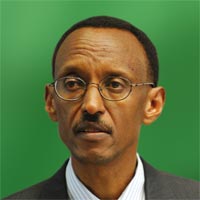
Rwanda’s President
Paul Kagame
|
|
|
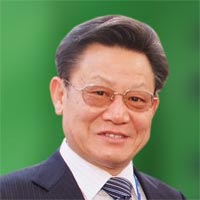
United Nations Under-Secretary-General for Economic
and Social Affairs, Sha Zukang |
|
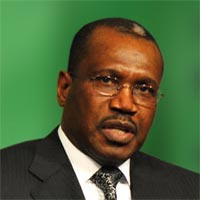
ITU Secretary-General,
Dr Hamadoun I. Touré |
|
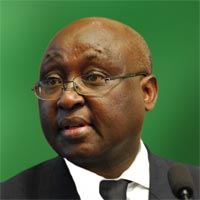
President of the African Development Bank,
Donald Kaberuka |
| |
|
|
|
|
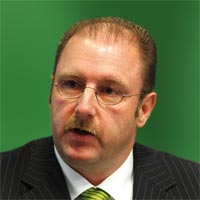
Director of Operations,
World Bank, Africa Region,
Hartwig Schafer
|
|
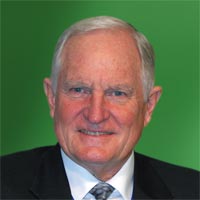
Chairman of the Board of Intel Corporation and Chairman of the United Nations
Global Alliance for ICT and Development (GAID), Craig R. Barrett |
|
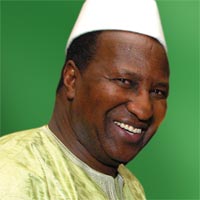
Chairperson of the Commission of the African Union,
Professor Alpha Oumar Konaré |
A general selection from the Summit
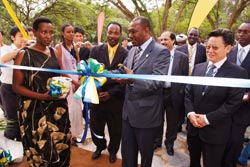
Rwanda’s Minister of State in charge of Energy and Communications, Albert
Butare with ITU Secretary-General, Dr Hamadoun Touré, cutting the ribbon to
inaugurate an
ICT Exhibition, and United Nations Under-Secretary General for Economic and
Social Affairs, Sha Zukang |
|
"Capacity Building and Deploying Applications for E-Services" session |
| |
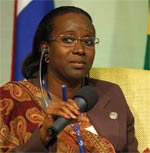 |
Mali’s Minister of Communication and Information Technologies,
Diarra Mariam Flantié Diallo |
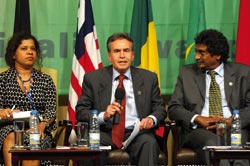
"Creating an Enabling Environment for Investment" session with Valerie
d’Costa, Programme Manager, World Bank Group–InfoDev; Reza Jafari, Chairman of
the Board, ITU Telecom; and Jay Naidoo, Chairman, Development Bank of Southern
Africa |
|
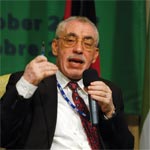 |
Tunisia’s Minister of Communication Technologies,
El Haj Gley |
| |
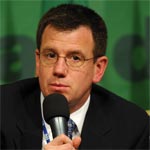 |
Microsoft Corporation’s Vice President, Unlimited Potential Group,
Michael Rawding |
| |
Opening ceremony |
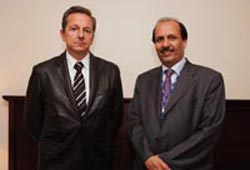
Special adviser to the President of the European
Commission, José Manuel de Morais Briosa e Gala with
ITU Telecommunication Development Bureau Director
Sami Al Basheer Al Morshid |
|
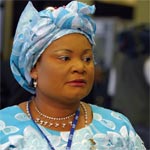 |
Malawi’s Minister of Information and Civic Education, Patricia Kaliati |
| |
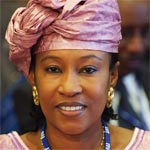 |
Gambia’s Secretary of State for Communications and Information Technology,
Neneh Macdouall-Gaye |
All photographs in this article are by M. Zouhri.
|


